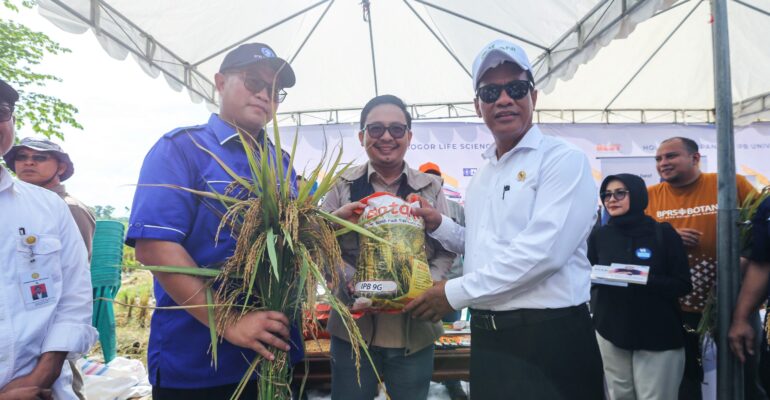IPB University Launches 9G Climate-Smart Rice Seeds as Future Agricultural Solution

Answering the need for environmentally friendly rice seeds that are adaptive to climate change, IPB University launched the IPB 9 Garuda (9G) rice seed variety on Friday (19/4) in Blawirejo Village, Lamongan Regency, East Java.
The IPB 9G variety invented by IPB innovator, Dr Hajrial Aswidinnoor, brings a new era in ‘climate-smart’ agriculture with seed innovations that are adaptive in acidic soils, resistant to pests and diseases and more efficient fertiliser and water requirements. The productivity of this rice plant can reach a maximum of 11 tonnes of harvested dry grain (GKP) per hectare. This variety was also planted in Purwakarta and achieved a productivity of 10.7 tonnes GKP per hectare.
The Minister of Agriculture of the Republic of Indonesia, Andi Amran Sulaiman, appreciated IPB University for the innovation of the IPB 9G rice variety. According to him, this IPB 9G rice variety research can save 20 per cent fertiliser.
“Imagine if 100 per cent of us use this seed, we can save fertiliser for rice up to 10 trillion rupiah. Our dream would be for Indonesia to become the world’s food barn,” he said while attending the launching ceremony of the IPB 9G rice seed variety.
Rector of IPB University, Prof Arif Satria said that the presence of IPB 9G climate-smart rice seeds can answer the challenges of climate change and national productivity.
“The agricultural sector is one of the largest contributors to greenhouse gas emissions that contribute to climate change. The development of climate-smart rice seeds needs to be continuously supported by the parties to realise a more advanced national agriculture,” he said.
Prof Arif revealed that IPB University’s footsteps in pioneering climate-smart agriculture in Indonesia can be followed by other universities and institutions.
“IPB University will continue to innovate in creating solutions for advanced agriculture in Indonesia, hopefully in the future other universities and institutions can participate in developing the concept of climate smart agriculture in their innovations,” he said.
The results of the IPB 9G planting trial, which is a climate-smart seed variety, can save water needs up to 10-20 per cent. In terms of fertiliser use, IPB 9G is also 25 per cent more efficient than other common varieties. Thus, the efficient use of chemical fertilisers can minimise the environmental impact of rice farming.
Vice Rector of IPB University for Research, Innovation and Agromaritime Development, Prof Ernan Rustiadi explained that the productivity of IPB 9G could be 10 to 20 per cent higher than the current dominant varieties. He added, “With these advantages, we expect farmers who use this variety can save production costs with optimal yields.”
Before being launched to the market, the IPB 9G variety had been sold on a limited basis, one of which had been planted on the land of Wahid, a farmer from Mantup Village, Lamongan. He expressed satisfaction with the yield of IPB 9G.
“The panicles are long and denser than other varieties. It is also easy to maintain but the yield is even higher,” he said. Wahid admits that the use of IPB 9G can save planting costs, is resistant to pests and diseases, and can increase his income.
“I highly recommend IPB 9G. Please come and see the IPB 9G rice that I grow,” he added.
In this event, Prof Ernan specifically thanked PRISMA (a partnership programme between the Government of Indonesia and the Government of Australia for the growth of national agricultural markets), which has supported IPB University in promoting and educating farmers to use superior rice seed varieties, including climate-smart rice seeds.
“Changing farmer behaviour is one of the biggest challenges in agribusiness. Through cooperation with PRISMA, we are able to market seeds to farmers through education-based marketing that can encourage farmers to adopt climate-smart seeds,” he said.
The launch event of the IPB 9G climate-smart rice seed variety was attended by representatives of the Indonesian Ministry of Agriculture, the Ministry of Education, Culture, Research and Technology (Kemendikbudristek), the National Research and Innovation Agency (BRIN), and representatives of the Lamongan Regency Agriculture Office.
Also attended by rectors and deans from Sultan Ageng Tirtayasa University (Untirta), Gorontalo State University (UNG), Padjadjaran University (Unpad), Mulawarman University (Unmul), Tanjungpura University (Untan), Semarang State University (Unnes), Surabaya State University (Unesa), Gadjah Mada University (UGM), Pattimura University (Unpatti), Sepuluh Nopember Institute of Technology (ITS), Airlangga University (Unair), Veteran National Development University (UPN) of East Java, Hasanuddin University (Unhas), and Brawijaya University (UB).
The Minister of Agriculture Amran and the guests were invited to see the rice fields that have been planted with IPB 9G seeds and see the demonstration plots of other climate-smart rice seed varieties being developed by IPB University, namely IPB 12 S 13 S, 14 S, and 15 S.
Development of Climate-Smart Rice Seeds
IPB University has established a partnership with PRISMA since 2021 for marketing and educating superior rice seeds to smallholders. Through this partnership, PRISMA supports IPB University in conducting trials of climate-smart seed varieties, connecting with local seed breeders and distributors to expand market coverage, and providing insight into farmer behaviour for future seed development.
This collaboration was successful in introducing IPB 3S climate-smart rice seeds to smallholder farmers in the Central Java region. This achievement gave IPB University the confidence to develop and launch the IPB 9G variety as a follow-up innovation to the 3S variety, as well as the 12-15G variety which is still in the commercial trial stage. (dr/Rz) (IAAS/RUM)


